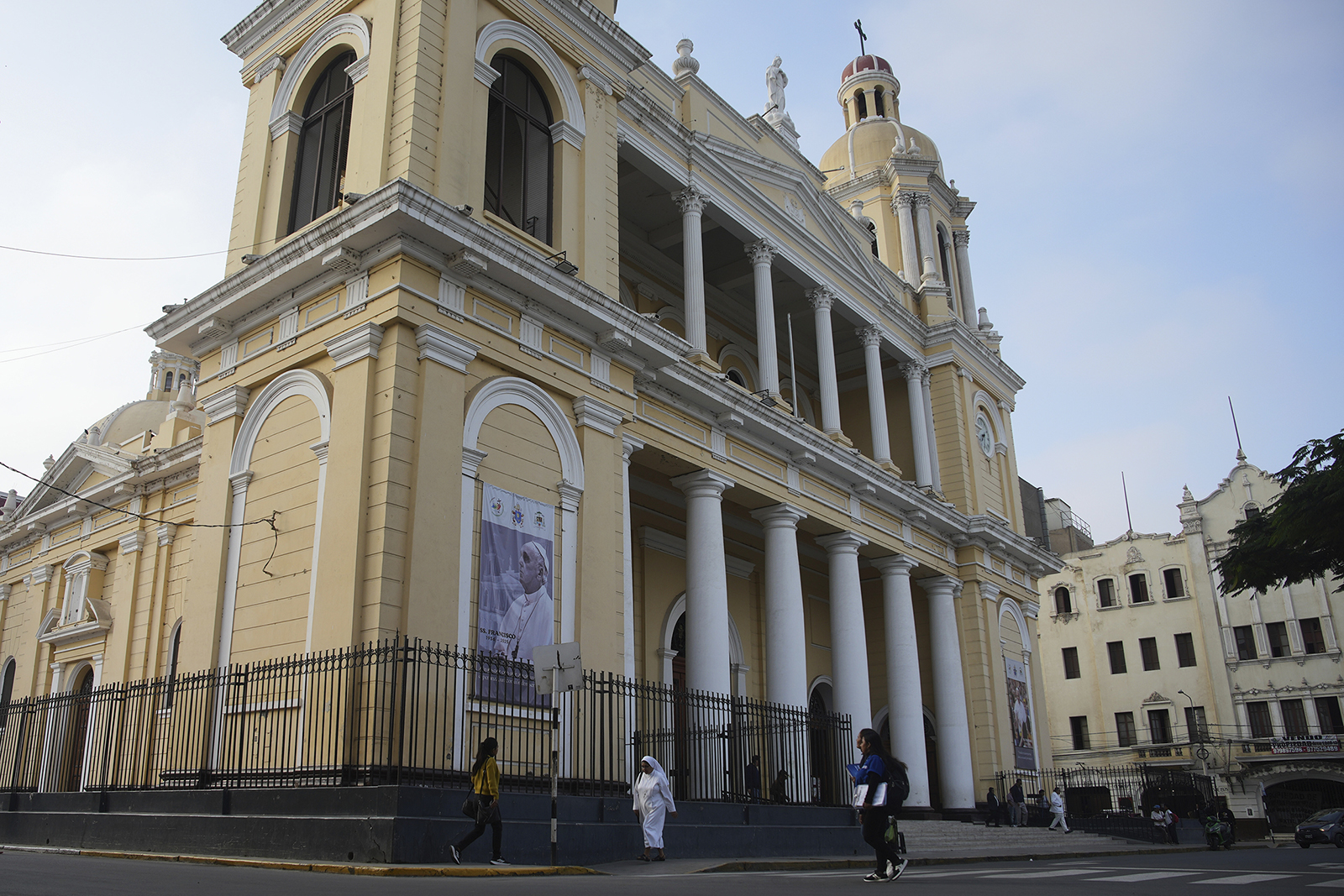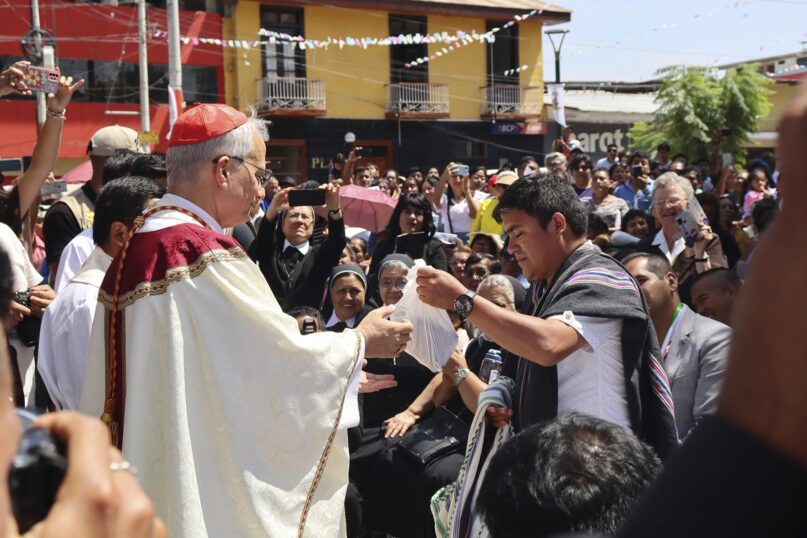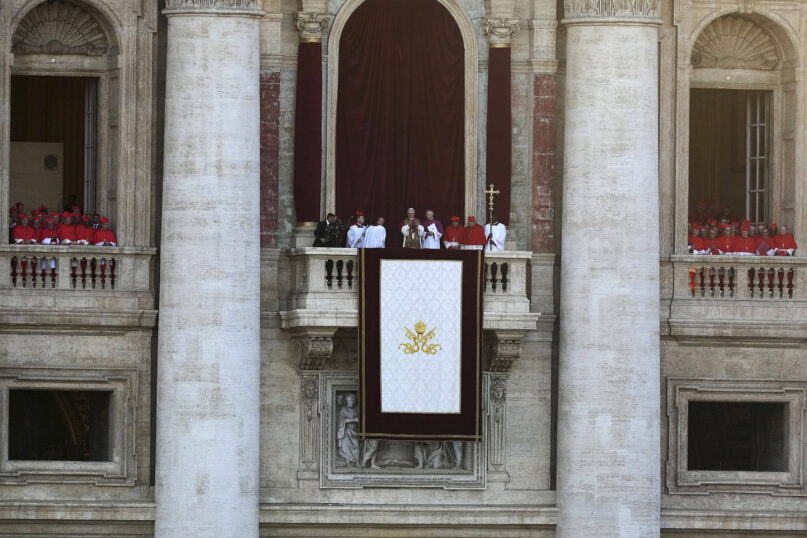
(RNS) — A Peruvian woman who says she was sexually abused by two priests as a girl traveled to Pope Leo XIV’s hometown of Chicago in late July to personally tell media her claims of how the newly elected pope mishandled her case when he served as bishop of Chiclayo, Peru.
Organized by The Survivors Network of those Abused by Priests, the July 31 press conference was the first time Ana María Quispe Díaz, whose story has been amplified by advocates and rehashed in media, spoke for herself since Leo’s election.
Quispe Díaz told reporters she first met with Leo, then-Bishop Robert Prevost, in 2022 to report two priests that she and other Chiclayo women claim abused them as girls. Initially, she said, Prevost encouraged her to report the abuse to civil authorities, but, according to Quispe Díaz, he later failed to properly investigate, remove the accused priests from ministry or provide adequate support for survivors.
Despite Prevost’s initial posture of support, Quispe Díaz claimed he told her there was no way to carry out a church investigation and that they must rely on the civil system. She said Prevost and other diocesan leaders did not approach the situation with transparency and did not take sufficient actions against the accused priests, the Revs. Eleuterio Vásquez Gonzáles and Ricardo Yesquén Paiva.
SNAP, a survivor-run advocacy group based in the U.S., said they organized the conference to give Quispe Díaz a platform to tell her story to English-speaking media. However, a Spanish-to-English translator hired by SNAP for the press conference made several translation errors that altered the meaning of Quispe Díaz’s words.
“We were listened to and encouraged to report what happened to us,” said Quispe Díaz in Spanish at the press conference. “We reported exactly what happened to us,” the translator incorrectly said in English.

Ana María Quispe Díaz speaks during an interview. (Video screen grab)
“We were mistreated by those representatives of Christ who, by faith, we call fathers,” she said in Spanish at the press conference. “We have been denied representation of Jesus Christ who through faith we call father,” the interpreter mistranslated.
Sarah Pearson, spokesperson for SNAP, told RNS she had hired CBS translation for the first time based on Google reviews, something she would not do again. Pearson is now working with another translator to dub a correct translation over the video of the event to send to reporters.
The press conference, with its serious translation errors, indicated the difficulties Quispe Díaz has faced as her story is scrutinized on an international stage — and the challenge for the international Catholic community in understanding a Peruvian abuse case that now has global implications.
Paola Ugaz, a Peruvian investigative journalist who exposed sexual abuses by the powerful Peruvian Catholic group Sodalitium Christianae Vitae, told RNS Prevost’s handling of the case needs to be understood within a Latin American context.
Many Latin American bishops “persecute the messenger” with threats and wouldn’t encourage women to go to civil authorities as Prevost did, according to Ugaz. Prevost also sent the case to the Vatican’s Dicastery for the Doctrine of the Faith, which Ugaz believes showed he took it seriously and wanted the women to be protected. Sending the case to the Vatican is “a measure that Latin American bishops don’t do because either they don’t know or they want to protect priests,” said Ugaz in Spanish.
Leo is credited by Sodalitium survivors as having an instrumental role in moving Pope Francis and the Vatican to suppress the group, and he has praised Ugaz’s “unwavering pursuit of justice and commitment to truth” as she and another journalist have faced lawsuits, death threats, false accusations and judicial harassment.
“Unfortunately, in my country, Peru, most people who report cases of abuse do not find justice at the end of their story. The system is designed to favor the perpetrator and neglect the victim. It’s a mistake to apply North American standards,” said Ugaz.
The church’s actions against Sodalitium, suppressing the group, only came 15 years after she began to investigate, Ugaz said, and despite over a decade of investigation into Sodalitium abuses, no perpetrators have been convicted in Peru courts.
SNAP has not reached out to Sodalitium survivors and has not included those survivors’ praise for Leo in its communications. For Pearson, different global norms shouldn’t mean an abuse case is dealt with any less expediently, thoroughly or safely.
“Why would you apply one standard in the United States and another standard in Latin America?” she asked, pointing out Leo comes from a U.S. background.
Quispe Díaz told RNS that the pressure as the only public-facing survivor, even as she says 14 other girls have shared stories of abuse by the same priests, “was something I could not bear.”
The diocese publicly contradicted some of her story, “basically saying I was lying.”
“Basically, I was submerged,” she said. Her neck was so tense every movement brought pain. She’s had constant, debilitating migraines, preventing her from holding a job. Because of that, debts have piled up, Quispe Díaz told RNS.

Cardinal Robert Prevost leads the celebration anniversary of the Diocese in Chulucanas, Peru, Aug. 12, 2024. (Photo courtesy Diocese of Chulucanas)
Stephanie Krehbiel, abuse advocate and executive director of Into Account, said Quispe Díaz’s experiences are common.
“ Nothing that churches do is really for survivors,” she said. “Nothing that happens within the context of a church-led investigation can really be seen as something that is there to make a survivor seen, heard, and believed. Those things are there to protect an institution.”
The case has drawn scrutiny partly because of reporting by Crux, a Catholic news outlet, and Peruvian media that the women were initially represented by former canon lawyer Ricardo Coronado, who had ties to Sodalitium and was later defrocked for sexual misconduct. Several sources speculated that Coronado may have been seeking revenge for a longstanding grudge against Prevost.
Quispe Díaz told RNS the women didn’t know who Coronado was (a canon lawyer). “In the end we did not have a good relationship,” she said, adding she’s now sure “his purpose was never to help us.”
Though Quispe Díaz has stayed out of the public eye since Leo’s election, SNAP has continued to bring attention to her story. She traveled to Chicago for the press conference after attending SNAP’s annual conference in Harrisburg, Pennsylvania.

Pope Leo XIV appears on the balcony of St. Peter’s Basilica after his election, at the Vatican, Thursday, May 8, 2025. (AP Photo/Antonio Calanni)
SNAP, based in the U.S., began its advocacy around the 2025 conclave before Pope Francis died, saying no U.S. cardinal, including Prevost, was fit to be pope because of their histories on sexual abuse and filed a complaint under Pope Francis’ anti-abuse law, “Vos Estis Lux Mundi,” against Prevost in March 2025. Before the conclave concluded, the group had raised concerns about the majority of the top contenders for the papacy.
Despite the translation errors at the press conference, Quispe Díaz is grateful to SNAP for elevating her voice.
“While the priests, cardinals, bishops, the pope are facilitators of these abusers, the abuse won’t stop,” she said.
The same day as the press conference, SNAP sent Leo a letter asking him to institute zero tolerance policies against abusers and church leaders who conceal abuse, to take responsibility for mishandling the Chiclayo case and to denounce “threats and retaliation” that the survivors have experienced.
The diocese said in a 2023 statement that it asked Vásquez to leave his parish and stop practicing ministry, but Quispe Díaz and other survivors have distributed social media screenshots showing him continuing to celebrate Mass throughout 2023, after Prevost had been appointed to a Vatican position.
Neither the Diocese of Chiclayo nor the Vatican responded to requests for comment.
Some contradictions between the diocese and Quispe Díaz may reflect different interpretations of “Vos Estis Lux Mundi.”
The diocese’s statement and Crux reporting indicate that Prevost and the diocese thought referring the women to the diocesan listening center met the requirement to offer “medical assistance, including therapeutic and psychological assistance.” But Quispe Díaz argues a referral to that center, staffed by a diocesan priest, was not appropriate psychological care.
Quispe Díaz says the diocese has reimbursed her for “psychiatric costs” three times, but the process was slow, leaving her “in distress” over the high costs. In July letters, the Rev. Giampiero Gambaro from the diocese told Quispe Díaz and the other women victims that he needed receipts and invoices for reimbursement.
In the letters, Gambaro also wrote of the status of the two priests, saying Yesquén is “no longer conscious of his faculties” and Vásquez has requested to be laicized, a Vatican process that should take six to seven months.
Gambaro urged the women, despite the “emotional strain,” to wait for the laicization process to be completed before making public statements about Vásquez, saying premature disclosure could “jeopardize the success of the proceedings.”
Krehbiel said, “ There’s a reason why we talk about timeliness being trauma-informed.
“ What she’s hearing from them is, ‘Well, basically because of bureaucracy and paperwork, you’re gonna have to wait another six months of agony before we affirm that you’re not a liar,’” she added.
The advocate also said delays create uncertainty for survivors, who, because of their life experiences, don’t trust the church will follow through. Quispe Díaz pointed out in a letter to Gambaro that he had previously said the process would take three to four months, not six to seven.
Quispe Díaz told RNS she wants transparent processes, advocacy for survivors, the naming and laicization of abusers and church support for civil legal processes.
“Justice for me is for the pope and the Vatican to become really responsible for the children, that they protect the children, the victims and the survivors,” said Quispe Díaz. “They are the important ones.”
